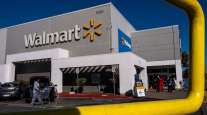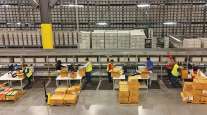Bloomberg News
Big Grocers Profited From Pandemic More Than Smaller Rivals

[Stay on top of transportation news: Get TTNews in your inbox.]
Large grocery retailers’ annual profits rose during the COVID-19 pandemic and have remained elevated in the years since, which warrants deeper scrutiny, according to a report released by the Federal Trade Commission.
The report collected information confidentially from retail giants Amazon.com Inc. and Walmart Inc. as well as chains like Kroger Co. for an investigation of grocery supply chain disruptions. It concluded the largest grocery stores gained a competitive advantage over smaller rivals.
“As the pandemic illustrated, a major shock to the supply chain can have cascading effects on consumers, including the prices they pay for groceries,” FTC Chair Lina Khan said in a statement. “The FTC’s report examining U.S. grocery supply chains finds that dominant firms used this moment to come out ahead at the expense of their competitors and the communities they serve.”
The report doesn’t allege any of the companies engaged in illegal activity. An FTC official described the study as a holistic look at the grocery market. The FTC commissioners voted 3-0 to release the staff report.
Walmart Inc. ranks No. 2, Amazon.com Inc. No. 9 and Kroger Co. No. 38 on the Transport Topics Top 100 list of the largest private carriers in North America.
Among the companies that submitted data, and their private carrier ranking, were C&S Wholesale Grocers (98), Associated Wholesale Grocers Inc., McLane Co. (8), Procter & Gamble Co., Tyson Foods Inc. (11) and Kraft Heinz Co.
Food and beverage retailer revenues increased to more than 6% over total costs in 2021, a spike over a previous 2015 peak of 5.6%, according to the report. That trend has persisted: In the first three quarters of 2023, retailer revenues reached 7% over total costs.
The numbers cast “doubt on the assertions of some companies that rising prices at the grocery store are the result of retailers’ own rising costs,” according to the report, which said the rising profits merit “further inquiry” by the FTC.
Want more news? Listen to today's daily briefing above or go here for more info
Among other findings, the report said large grocery purchasers — including Walmart — threatened to fine suppliers if they didn’t deliver items on time. Larger stores imposed more stringent penalties than smaller stores, which meant suppliers often prioritized larger retailers for deliveries of key items such as toilet paper and other groceries.
The report said those fines likely gave the big firms “a competitive advantage relative to other retailers, especially smaller retailers, during a time when having products in stock was a critical point of competitive differentiation.”




